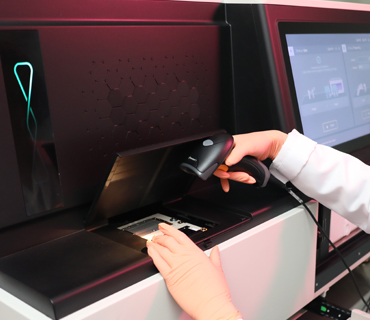ماجستير في الطب الشخصي

Msc. in Personalized Medicine
Program Overview
Personalized Medicine can be defined as products and services that leverage the science of genomics and proteomics directly or indirectly and capitalizes on the trends toward wellness and consumerism to enable tailored approaches to prevention and care for an individual or a society.
Establishment of the human genome and advances in proteomics has led to a rapidly advancing field of healthcare that is informed by each person‘s unique clinical, genetic, genomic makeup, and environmental information. These help scientists and physicians to develop targeted diagnostics and therapeutic approaches to achieve more personalized management by identifying individual’s susceptibility to diseases and response to particular treatments. The program focuses on complex diseases with multigene components influenced by environmental factors that interact with the human genome such as cancer, heart disease, neurologic and neuropsychiatric disorders, obesity and diabetes. Such diseases represent an enormous burden in the countries of the Gulf Cooperation Council (GCC) countries.
Vision
To be a unique, innovative and effective educational and research program serving the health needs of the GCC citizens, and contributing globally to excellence in research and development, clinical services and health education.
Mission
To acquire familiarity with genetic and genomic testing and gain theoretical and practical knowledge of personalized medicine and its role in making the treatment individualized to the disease and patient.
Program Objectives
To build the competence and capability of health professionals in managing patients in a personalized context.
To apply recent advances in knowledge and technology in the various areas of Personalized Medicine.
To develop research capability towards advancing the field of Personalized Medicine.
Learning Outcomes
By the end of this program, graduates should be able to:
- Design or apply an effective individualized tailored therapy.
- Personalize healthcare and improve patient outcomes through:
- Carrying out more precise diagnostics.
- Eliminating unnecessary treatments and minimize side effects.
- Achieve cost effective healthcare.
- Carrying out more precise diagnostics.
- Conduct clinical research.
Methods of Assessment
Students’ performance will be evaluated based on:
- Student Performance including presentations (30%)
- Written assignment (30%)
- Final written exam (40%)
Admission Requirements
- The applicant is a citizen of one of the GCC countries or a citizen of an Arab country and is a resident in one of the GCC countries.
- Nomination/no objection letter from the Ministry of Education or Higher Education of the applicant’s country (GCC citizens).
- A medical degree or a bachelor’s degree in one of the health sciences or related fields (for example, but not limited to, life sciences, bioinformatics, biochemistry, dentistry or pharmacy) from a university recognized by AGU.
- A minimum overall average of “Very Good” to be considered for the Master of Science and “Good” to be considered for the Diploma.
- Two years’ experience in a health-related profession (Fresh graduates may be considered on merit).
- Evidence of adequate proficiency in the English language (Minimum TOEFL Score of 450 or IELTS of 5.0).
- Courses in molecular biology or genetics are required.
- Courses in biochemistry, biology and cell biology are recommended.
- Final acceptance shall be made after passing a personal interview.
Graduation Requirements
Master of Science
- Successfully complete a minimum of 28 credit hours of course work.
- Carry out a laboratory-based research project and successfully defend a written thesis (8 credit hours).
- Obtain a minimum cumulative GPA of 3.0 out of 4.0.
Diploma
- Successfully complete a minimum of 24 credit hours of course work.
- Satisfactorily complete a Diploma project (4 credit hours)
- Obtain a minimum cumulative GPA of 2.0 out of 4.0.
